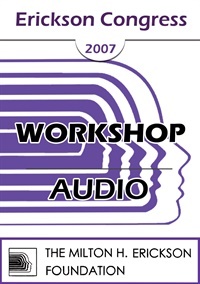
- Average Rating:
- Not yet rated
- Topic Areas:
- Workshops | Anxiety | Depression | Ericksonian Hypnosis and Therapy Techniques | Self-Relations | Utilization
- Categories:
- Erickson Congress | Erickson Congress 2007
- Faculty:
- Stephen Gilligan, PhD
- Duration:
- 1:50:36
- Format:
- Audio Only
- Original Program Date:
- Dec 07, 2007
- Short Description:
- A key idea in Milton Erickson's work was that a person's problematic experiences and behaviors can be skillfully accepted and utilized as the basis for therapeutic change. Self-Relations psychotherapy develops this idea further, emphasizing symptoms as indicating the death of an old identity and the impending birth of a new identity. Thus, we don't try to "get rid of" depression, anxiety, or other "acting out/acting in" expressions, but instead invite them into a human relationship of "sponsorship", where their healing and helpful nature may be realized. We will see how a therapist can generate a ritual space where symptoms and other disturbing experiences can be "midwifed" into new identities.
- Price:
- $15.00 - Base Price
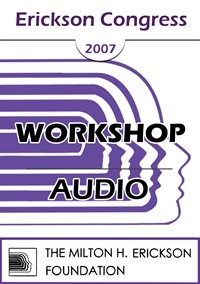
- Average Rating:
- Not yet rated
- Topic Areas:
- Workshops | Addiction | Children and Adolescent Therapy | Depression | Eating Disorders | Ericksonian Hypnosis and Therapy Techniques | Hypnosis | Metaphors | Phobia | Trauma | Trance
- Categories:
- Erickson Congress | Erickson Congress 2007
- Faculty:
- Cheryl Bell-Gadsby, M.A., R.C.C.
- Duration:
- 1:54:20
- Format:
- Audio Only
- Original Program Date:
- Dec 07, 2007
- Short Description:
- This workshop will provide participants with innovative and supportive strength-based interventions to address the unique impact of violence and trauma on adolescent girls. A model for applying Ericksonian hypnosis and metaphor will be presented and practiced. These techniques can be used to facilitate clients in reconnecting to a healthy mind/body state by applying tools for understanding and working with the expressions of trauma such as disordered eating, suicidal ideation, self-harming, addiction, depression, anxiety and phobias in the daily lives and relationships of young women.
- Price:
- $15.00 - Base Price
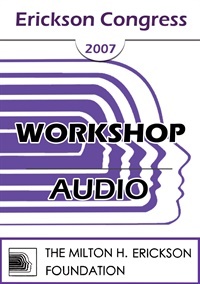
- Average Rating:
- Not yet rated
- Topic Areas:
- Workshops | Depression | Hypnosis
- Categories:
- Erickson Congress | Erickson Congress 2007
- Faculty:
- Claude Virot, MD
- Duration:
- 1:48:52
- Format:
- Audio Only
- Original Program Date:
- Dec 07, 2007
- Short Description:
- The diagnosis of depression has two very different realities which can make treatment difficult. We will describe a depression that begins with acute and chaotic symptoms. The use of hypnosis in the beginning acute and chaotic phase is very important and usually has a quick and effective result.
- Price:
- $15.00 - Base Price

- Average Rating:
- Not yet rated
- Topic Areas:
- Anxiety | Depression | Dialogues
- Categories:
- Erickson Congress | Erickson Congress 2011
- Faculty:
- Carolyn Daitch, PhD | Reid Wilson, PhD | Michael Yapko, PhD
- Duration:
- 1:02:02
- Format:
- Audio Only
- Original Program Date:
- Dec 10, 2011
- Short Description:
- IC11 Dialogue 08 – Comorbid Anxiety and Depression – Carolyn Daitch, PhD, Reid Wilson, PhD, and Michael Yapko, PhD
- Price:
- $15.00 - Base Price
Tags: Anxiety Depression
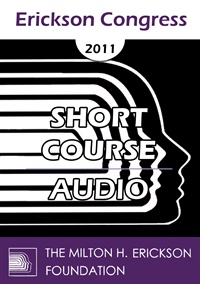
- Average Rating:
- Not yet rated
- Topic Areas:
- Short Courses | Hypnosis | Brief Therapy | Hypnotherapy | Anxiety | Cognitive Behavior Therapy (CBT) | Depression
- Categories:
- Erickson Congress | Erickson Congress 2011
- Faculty:
- Assen Alladin, PhD
- Duration:
- 1:32:25
- Format:
- Audio Only
- Original Program Date:
- Dec 09, 2011
- Short Description:
- There is growing evidence for an additive effect when hypnosis is combined with brief therapies in the management of various emotional disorders. This workshop will describe Cognitive Hypnotherapy, an innovative integrated approach to brief psychotherapy that systematically combines hypnotic techniques with CBT in the management of various emotional disorders to enhance treatment outcome and prevent relapse. This course will be invaluable to therapists who wish to broaden their skills in the management of emotional disorders.
- Price:
- $15.00 - Base Price
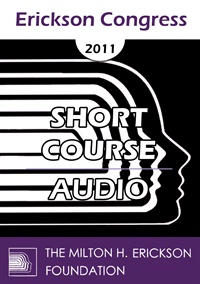
- Average Rating:
- Not yet rated
- Topic Areas:
- Consciousness | Short Courses | Anxiety | Depression | Post-Traumatic Stress Disorder (PTSD) | Therapist Development
- Categories:
- Erickson Congress | Erickson Congress 2011
- Faculty:
- Virgil Hayes, DO
- Duration:
- 1:08:15
- Format:
- Audio Only
- Original Program Date:
- Dec 09, 2011
- Short Description:
- Consciousness can be defined as increased awareness. Simply put it is, “seeing a bigger picture.” The more you understand yourself, the easier it is to understand other. AN individual’s consciousness is the “x” factor in therapeutic encounters. The short course with lecture and case discussions is useful to all skill levels. Non-pathological understandings and co-created solution for anxiety, depression, and PTSD are included in case discussions.
- Price:
- $15.00 - Base Price
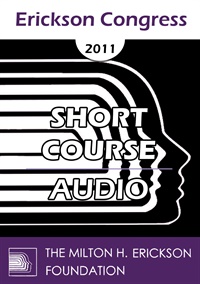
- Average Rating:
- Not yet rated
- Topic Areas:
- Short Courses | Hypnosis | Mind-Body | Hypnotherapy | Anxiety | Depression | Eating Disorders
- Categories:
- Erickson Congress | Erickson Congress 2011
- Faculty:
- Brigitta Loretan-Meier, MS
- Duration:
- 1:33:20
- Format:
- Audio Only
- Original Program Date:
- Dec 09, 2011
- Short Description:
- Irritable Bowel Syndrome (IBS) is one of the most common gastrointestinal disorders. This presentation explains an interdisciplinary approach to dealing with serious problems of IBS-patients. We learn that there are multiple expectations and needs of the clients with a high level of dysfunctional symptoms, as well as multiple stress factors, anxiety and depression. How to regain a better quality of life scores? The importance of focusing the invisible, the affective part of the IBS difficulties is complicated. While setting realistic goals, a new approach leads to body self-regulation with different bodywork techniques and hypnotherapeutic strategies.
- Price:
- $15.00 - Base Price
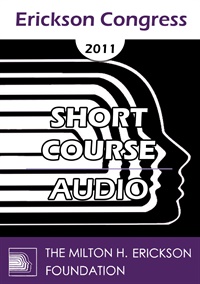
- Average Rating:
- Not yet rated
- Topic Areas:
- Cognitive Behavior Therapy (CBT) | Depression | Short Courses | Mindfulness | Attention Deficit Disorder (ADD)
- Categories:
- Erickson Congress | Erickson Congress 2011
- Faculty:
- Joseph Sestito, MSSA, LISW-S
- Duration:
- 1:34:42
- Format:
- Audio Only
- Original Program Date:
- Dec 09, 2011
- Short Description:
- The basics about mindfulness and cognitive-behavioral therapy will be explained, along with the re-search findings which show that aerobic exercise helps both ADD and depression through improving brain functioning. Participants will become acquainted with ten mindfulness skills, four CBT methods and five types of aerobic exercise which can help their clients. Participants will see how they can be the instruments who help their clients deliver themselves from distraction to distinction.
- Price:
- $15.00 - Base Price

IC11 Topical Panel 07 - Depression - Marilia Baker, Maggie Phillips, Michael Yapko, and Jeffrey Zeig
- Average Rating:
- Not yet rated
- Topic Areas:
- Depression | Topical Panels
- Categories:
- Erickson Congress | Erickson Congress 2011
- Faculty:
- Marilia Baker, MSW | Maggie Phillips, PhD | Michael Yapko, PhD | Jeffrey Zeig, PhD
- Duration:
- 59 Minutes
- Format:
- Audio Only
- Original Program Date:
- Dec 07, 2011
- Short Description:
- Topical Panel on Depression, featuring Marilia Baker, Maggie Phillips, Michael Yapko, and Jeffrey Zeig
- Price:
- $20.00 - Base Price
Tags: Depression
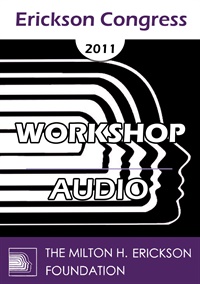
- Average Rating:
- Not yet rated
- Topic Areas:
- Depression | Hypnosis | Family Therapy | Workshops
- Categories:
- Erickson Congress | Erickson Congress 2011
- Faculty:
- Camillo Loriedo, MD, PhD
- Duration:
- 59 Minutes
- Format:
- Audio Only
- Original Program Date:
- Dec 07, 2011
- Short Description:
- Depressive patients are described by Lynn Hoffman as Sleeping Giants, that cannot be awaken by powerful efforts, while they are ready to arouse because of the delicate stimulus of a child. The role played by the non-depressed family members in the development, as well as in the treatment of depression can be considered very relevant. Some useful principles for utilizing hypnosis with depressive individuals and families as well as clinical examples will be presented together with both specific techniques and specific pitfalls that can be expected in the course of the therapeutic process.
- Price:
- $20.00 - Base Price
Tags: Depression Family Therapy Hypnosis
Please wait ...

